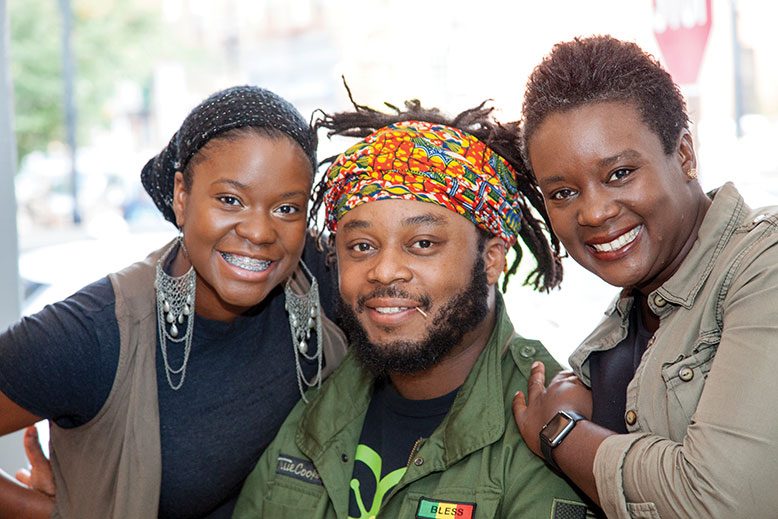
The three Williams kids grew up in South Orange listening to their father, Lenox, regale them with tales of African culture and history. Indeed, Africa was embedded in their given names: sisters Nataki, now 39, and Kanika, 32, and brother Kwame, 34.
What puzzled the sibs was that Lenox and their mother, Beverley, were Jamaican. A huge influence in the household was Beverley’s mom, Gloria Latibeaudiere, a superb Jamaican cook who passed her knowledge and love of the cuisine on to Beverley and to the three siblings.
“Our dad is Mr. Historian,” says Nataki, “and being from the island, we were always like, ‘We are not African. What does Africa have to do with anything?’”
They recently found out. It happened in the strangest of ways, as they prepared for the October opening of Freetown Café on Halsey Street in Newark, about two blocks from NJPAC.
A daytime spot with 27 seats, it serves Jamaican-accented salads, paninis like jerk chicken with avocado and plantains, coffees and beverages. Jimmy Cliff and Bob Marley issue from the speakers. Students wander in for a carrot juice with almond milk and nutmeg.
Freetown is the siblings’ second eatery. Their first is the popular and critically praised Vital, a Jamaican restaurant they opened in 2014 in Montclair, where all three now live.
Opening Vital was a spur-of-the-moment decision. Only Kwame, his love for food “birthed from my grandmother’s cooking,” had made cooking a career. His résumé includes stints at Rat’s in Hamilton, Highlawn Pavilion in West Orange and the Bernard’s Inn in Bernardsville.
Kanika, the youngest, was a beautician and event planner. Nataki, the oldest, was international vice president of finance at Viacom. She left after giving birth to a daughter in 2014.
Nataki had long wanted to go into business with Kwame. “We used to daydream about opening a gas station or a Subway franchise,” she says. Then one day in 2014 she saw a storefront for rent in Montclair. “I told Kwame, ‘Quit your job! I found a place!’”
The sibs quickly turned the storefront into Vital, initially labeling its food New Caribbean to distinguish it from typical Jamaican takeout—“oxtail and other things that aren’t what Jamaican food is really built on,” says Kwame. The name Vital, he explains, stems from the Rastafarian word “ital,” which “signifies vibrant, healthy, living food.” Much of the menu is vegan.
Early this year, the three publicly embraced Vital’s real identity, placing a sticker in the window that read, “Fresh. Creative. Jamaican.” “People started coming by, saying, ‘Oh! That’s what you are,’” says Nataki. “We weren’t putting who we are—Jamaicans who know Jamaican food—across the right way.” Business began to pick up.
Freetown Café came about serendipitously, too. A friend was about to open a soul food eatery in Newark called Freetown, but backed out. The Williamses grabbed the space. “We liked the idea of being entrepreneurs in a community where we could inspire other young African-Americans,” says Kwame. They kept the name, which, he admits, “we didn’t know anything about.”
Researching it, Kwame found that Freetown is the nickname of the Jamaican mountain village of Accompong. It was first a refuge for Maroons who escaped Spanish conquest. Later, under British rule, it swelled with escaped African slaves. In 1739, after more than 70 years of sporadic guerrilla warfare, the former slaves signed a peace treaty with the British and gained semi-sovereignty. Today, Freetown residents live on lands granted under the treaty and follow customs handed down by their indomitable forebears. Many elders still speak an African dialect.
At last the sibs fully got “what drove [Lenox’s] obsession with Africa,” says Nataki. Strangely, Lenox had never mentioned Freetown, but he knew of it, and “he loves that we discovered it. Now,” she adds with a laugh, “he is 10 times more annoying with all his African history talk.”



